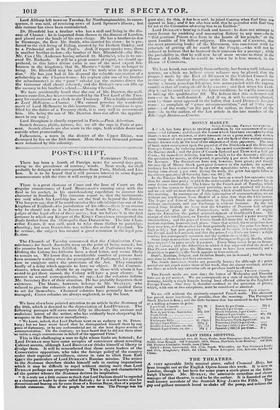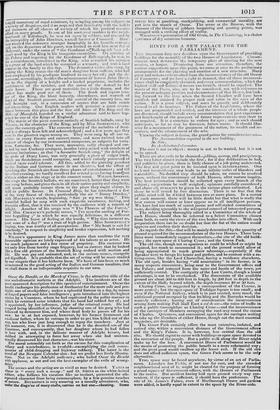THE THEATRES.
A VERY agreeable little musical piece, called Cramond Bri2, has been brought out at the English Opera-house this week. It is new in London, though it has been for some years a stock-piece at the Edin- burgh Theatre. Mr. MURRAY, the admirable comedian and clever manager of that theatre, is said to be the author. It is founded on the well-known anecdote of the Scottish King JAMES the Fifth. That gay and gallant monarch loved to shake off the pomp, and relieve the
insipid monotony of royal existence, by mingling among his subjects in / variety of disguises, and thus acqu red that familiarity with the habits and manners of all classes of society of which his poetical remains
afford so many proofs. In one of his nocturnal rambles in the neigh- bourhood of Edinburgh, he was set upon by robbers, and rescued by the intrepidity of John Howison, a small flamer at Creation& flow lion treated the unknown stranger hospitably in his humble cottage ; lad, on the departure of his guest, was invited to visit him next day at llolyrood, under the name of " the Goodman of:Balleng. ich "—a soh- r:quei used by the Kill in his incognito excursions. On arriving at the Palace and inquiring for the Goodman of Ballengeich, he was, to his astonishment, introduced to the King, who rtwardcd his services be a grant of the land which he occupied us a tenant ; and which hold temains in the family to this day. The dramatist varies this story, by making the King rescue the old man's daughter from ruffians, who had been employed by his profligate landlord to carry her off; and the de- nouement, accordingly, besides the advancement of honest John How i- con to the dignity of a knight and a landed proprietor, includes the punishment of the ravisher, and the union of the damsel to her rustic lover. These are good materials for a little drama, and the author has made good use of them. The frank and joyous tem- per of the King, the blunt honesty, shrewdness, and warmth of heart of the Scottish peasant, and the naivete of the country lass, are well brought out, in a succession of scenes that are both comic and interesting. Our English readers will perceive a great resem- blance between this piece and the fine old farce of The King and the of Mansfield, founded on a smiler adventure said to have hap- pened to one of the Kings of England. The music of the piece consists entirely of Scottish ballads, sung by Wissoe, in the character of the King, and by Miss SOMERVILLE, who oats the country-girl. The extreme beauty of the melodies of Scot- bud his always been felt and acknowledged ; and a few years ago they were in the greatest vogue among us. They were sung by all our vo- calists in every theatre and concert-room, and were twisted into all mauler of shapes by our instrumental composers, as subjects for varia. inns, fantasias, &c. They were, moreover, sadly changed and cor. ru, ted by our Cockney arrangers, besides being mixed with numbers of spurious imitations; so that " a favourite Scotch song," the delight of the gods of Drury Lane, was very generally a piece of vulgar trash, which no Scotcbman could recognize, and which nobody possessed of musical taste could tolerate. All this, added to the growing penchant fur the Italian and German music in our theatres, had the effect of '1.1nishing the Scottish airs from those places of entertainment ; and till the other evening, we hardly recollect for several years having heard:one of thcm either on the stage or in the concert•room. Wit.SON, however, who sings the Scottish ballads, we are convinced, better than they were ever sung before, and gives them in all their native purity and simplicity, will most probably restore them to the place they ought always to hold in public favour. In Cramond Brig, he has introduced a few of the very finest of them ; particularly the air " Bonny Dundee," with MACNEILL'S words, beginning, " Saw ye my wee thing." This beautiful ballad be sang with such exquisite sweetness, feeling, and dramatic effect, that it was received by the audience with a tumult of delight. Another of his songs was " The Flowers of the Forest," with Mrs. COCKBURN'S pathetic verses, " I've seen the smiling of For- tune beguiling ;" in which he was equally felicitous, in a different manner. His burst of feeling at the words, " Why thus torment us, poor sons of a day?" was a trait of high genius. Miss SOMERVILLE'S singing, too, was worthy of all acceptation. Her ". My heart is sair for somebody," in respect to simplicity and tender expression, left nothing to be desired.
Wissora's appearance in King James more than confirms the very favourable opinion we lately expressed of his talents as an actor. He has much judgment and a fine sense of propriety. His costume was not only free from tawdry stage frippery, but so correct that lie looked like a fine old picture of the Scottish King endued with motion and life. He was gay and animated, and, in the serious scenes, energetic and dignified. It is probable that the art of acting will be more studied by our singers than it has hitherto been. We have of late been so much accustomed to the good acting of the Italian and German vocalists, that we shall deem it an indispensable requisite in our own.



















 Previous page
Previous page